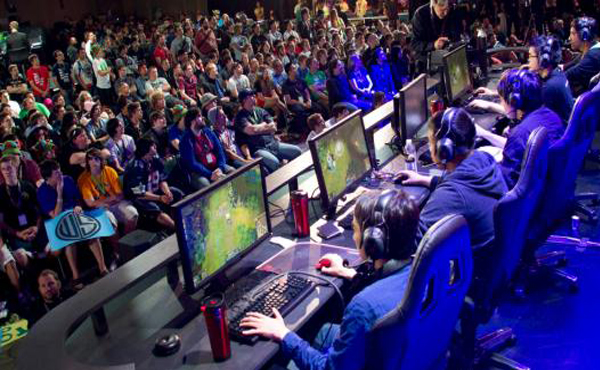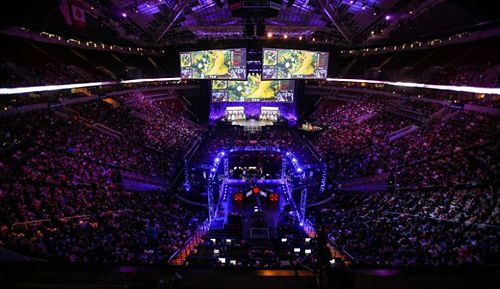Games
From DigitalRhetoricCollaborative
Contents |
Electronic Sports (eSports)
Electronic sports (also known as eSports or competitive gaming) is a term for organized multiplayer video game competitions[1]. They are very similar to sports in that they are commonly played before a live audience and have rewards for winners. Although eSports have long been a part of video game culture, competitions have seen a large surge in popularity from the late 2000's and early 2010's.[2] It is estimated that 71,500,000 people watched competitive gaming in 2013[3]. eSports gaining momentum, especially because of popular live streaming services like Twitch.tv, has resulted in bigger competitions with larger prize pools. League of Legends 2014 World Championship boasted $2 million in the prize pool. [4] Remediation is “ is the re-presentation of material in one medium through another.” [5] eSports has both absorbed traditional sports procedures such as using large stadiums and dressing up to support teams, while also being absorbed into traditional sports by having professional gamers being recognized as athletes [6] and eSports being present at sports conventions.
Gaming Sponsorships
Gaming sponsorships expand from small advertisements in professional gamers’ Twitch livestreams to large, corporate backing with brand attire. Intel has a long standing history as a sponsor in eSports, supporting numerous events and tournament series, it has become one of the most acknowledged brands in the world of competitive gaming.[7] With the Intel Extreme Masters (IEM), the company is funding the major league of ESL, the world’s oldest eSports league. Coca Cola cooperated with Riot Games to anchor Coke Zero as they started the League of Legends Challenger Series in 2013. Companies have developed specifically to help connect advertisers with professional gamers similarly to how recruiters will match athletes with the NFL or NHL. This remediation can be found in SponsorOP, the eSports Sponsorship Agency that has clients such as Team Vulcun and Velocity eSports.[8] Big companies are paying more attention to eSports; for example, League of Legends Team Curse partnered with Nissan North America. Certain companies have become so involved that they have launched their own eSports events. Red Bull has not only hosted their own events, but have sponsored professional gamers and treated them like real athletes, complete with “health and nutrition tips to enable peak performance when training and playing in virtual competitions.” [9] In addition, Red Bull has an entire subdomain on its main website dedicated to eSports, featuring news and articles like you would find on ESPN.com, divided up by game. [10]
As is the nature of corporate sponsorships, eSports have remediated the idea of players representing brands and wearing coordinated team outfits. Like sports, live eSports competitions commonly feature commercial breaks, and eSports has been used to launch or promote products and content such as theatrical releases like 3 Days to Kill, Brick Mansions, and Game of Thrones.[11]
Gaming Conventions and Conferences
With the rise of eSports, there are now dedicated conferences and competitions for eSports and specific eSports games. One is the LEc2 Convention, held June 12-13 2015 in Virginia, USA, was created as the only League of Legends convention on the east coast to accommodate those who could not travel to World competitions. [12] At the 9th Annual MIT SLOAN Sports Analytics Conference, there was a special panel titled “eSports: The Future of Competition.”[13] eSports has become integrated in both the sports industry and remediated its conference structure—both feature autograph signing, panels and talks, and merchandise. Another conference acts as a combination of the two ideas of eSports serving itself and eSports being looked at as alternative sports—Competitive Gaming Conference Europe, held in Commerzbank-Arena Frankfurt, Germany on June 6, 2015. It describes its purpose as a settlement about the “diplomatic status of gamers equal to athletes.” [14] Speakers include CEOs of gaming companies, international sales and marketing experts, researchers and advocates, and Michael Schulz of Football Players Agent, a TV expert, retired German soccer player, and independent journalist.[15] Over the past 10 years, eSports has evolved to a lucrative spectator sport capable of packing arenas like Los Angeles’ Staples Center and Seoul’s World Cup Stadium to capacity for championship bouts of League of Legends.[16] Typically reserved for sports, eSports have remediated traditional centers and stadiums for electronic gaming.
Sports Video Game Correlation with Sports
A study of sports video games consumption motives suggested that competition, peer pressure, and skill building for actual playing of sport had statistically significant impacts on the amount of time spent on game playing.[17] The findings indicate that competition is one of the three impact factors for sports video game playing—it is important for gamers to be better than others, to win over others, and to be faster and more skilled in their game experience. In addition, the studies show an overlap between sports gaming consumption and the chosen involvements in five of seven traditional sports behaviors and that sports video games may be an alternative but similar form of traditional sports consumption behavior. Overlaps illustrate that televised sports viewing and Internet usage specific to sport are more related to sports gaming.
Scholarship on Games & Learning
A growing number of rhetoric and composition scholars are interested in and/or double as gaming scholars; many of whom focus on gameful learning.
References
- ↑ http://www.digitalrhetoriccollaborative.org/2014/04/25/digital-lessons-remediation/
- ↑ http://www.digitalrhetoriccollaborative.org/2014/04/25/digital-lessons-remediation/
- ↑ http://www.redbull.com/ca/en/esports/stories/1331644628389/esports-in-numbers-five-mind-blowing-stats
- ↑ http://na.lolesports.com/articles/league-legends-world-championship-2014
- ↑ http://www.digitalrhetoriccollaborative.org/2014/04/25/digital-lessons-remediation/
- ↑ http://www.gamespot.com/articles/us-government-recognizes-league-of-legends-players-as-pro-athletes/1100-6411377/
- ↑ http://cgc-europe.com/marketing-channel-esports
- ↑ http://sponsorop.com/
- ↑ http://fortune.com/2014/07/24/esports-sponsors/
- ↑ http://www.redbull.com/us/en/esports
- ↑ http://fortune.com/2014/07/24/esports-sponsors/
- ↑ https://www.esportshq.com/convention/
- ↑ http://www.sloansportsconference.com/?p=5810
- ↑ http://cgc-europe.com/
- ↑ http://en.wikipedia.org/wiki/Michael_Schulz
- ↑ http://www.theglobeandmail.com/sports/more-sports/rise-of-spectating-games-or-esports-reshaping-the-future-of-competitive-gaming/article23261722/
- ↑ http://eric.ed.gov/?id=EJ954495



